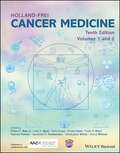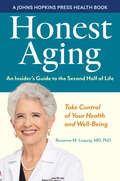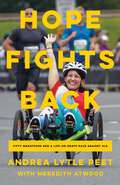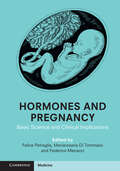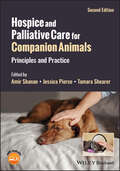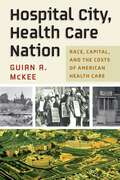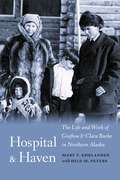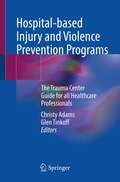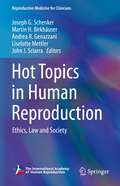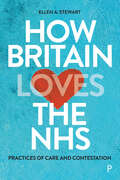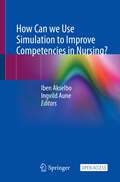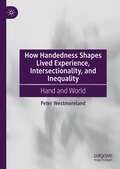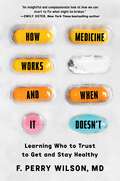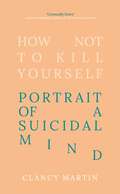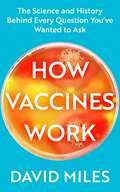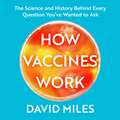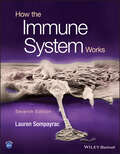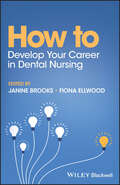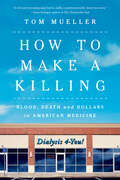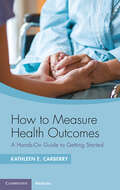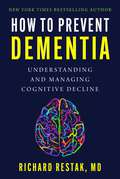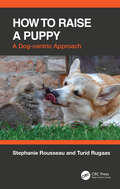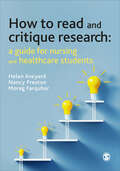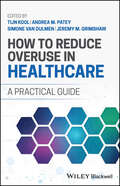- Table View
- List View
Holland-Frei Cancer Medicine
by Robert C. Bast JrHOLLAND-FREI CANCER MEDICINE The latest edition of the gold-standard in cancer science and clinical oncology references In the newly revised Tenth Edition of Holland-Frei Cancer Medicine, a team of distinguished researchers and practitioners delivers a comprehensive and up-to-date discussion of cancer science and clinical oncology practice. The book contains timely and indispensable information on epidemiology, etiology, cancer biology, immunology, prevention, screening, clinical presentation, pathology, imaging, and therapy. Grounded in a fundamental understanding of cancer biology, Holland-Frei Cancer Medicine combines scientific principles with clinical practice. It contains hundreds of full-color illustrations and photographs, tables, graphs, and algorithms that complement and enhance the complex topics discussed within the book. This book is an invaluable clinical tool that provides readers with overview boxes, additional references, and other pedagogic features designed to make the content easy to access and comprehend. Readers will also find: A translational and integrated approach throughout the book that combines cancer biology with cancer management A strong emphasis on multidisciplinary, research-driven patient care that improves outcomes and allows for the optimal use of all clinically appropriate therapies Discussions of the most current personalized cancer care, including molecular diagnostics and therapeutics Perfect for medical oncologists, radiation oncologists, and internists, Holland-Frei Cancer Medicine, Tenth Edition will also earn a place in the libraries of allied health professionals involved in the treatment of cancer patients. This book is published in collaboration with the American Association for Cancer Research: https://www.aacr.org/
Honest Aging: An Insider's Guide to the Second Half of Life (A Johns Hopkins Press Health Book)
by Rosanne M. LeipzigYour indispensable guide to taking charge of the second half of your life.From Dr. Rosanne M. Leipzig, a top doctor with more than 35 years of experience caring for older people, Honest Aging is an indispensable guide to the second half of life, describing what to expect physically, psychologically, functionally, and emotionally as you age.Leipzig, an expert in evidence-based geriatrics, highlights how 80-year-olds differ from 60-year-olds and why knowing this is important for your health. With candor, humor, and empathy, this book will provide you with the knowledge and practical advice to optimize aging. The book• helps you recognize age-related changes in your body and mind and understand what's typical with aging and what's not;• offers guidance for common health concerns, including problems with memory, energy, mood, sleep, incontinence, mobility and falls, hearing and vision, aches and pains, gastrointestinal problems, weight, and sex;• shares advice on how to make decisions about health care, driving, and where to live; • includes helpful checklists and lists of medications to prepare for doctor and hospital visits;• recommends the best technology options, such as mobility devices, emergency device systems, and more;• counters common myths about aging; and• offers resources for additional information, self-help, and support.Enriched by illustrations, patient stories, and deep dives into science and the latest research, Honest Aging gives you the tools to take control of your health and well-being as you age.
Hope Fights Back: Fifty Marathons and a Life or Death Race Against ALS
by Andrea Lytle PeetThe incredible story of a young woman living with ALS, who defies all odds by finishing fifty marathons and, in turn, inspires people to &“go on, be brave.&”Andrea Lytle Peet was thirty-three years old—an urban planner living in D.C., newly married, and a triathlete—when she received the death sentence of an ALS diagnosis (also known as Lou Gehrig's disease). After grappling with the fact that she will likely become paralyzed and die within two to five years, Andrea experienced an unexpected spark that changes her outlook in the most magnificent way. Inspired by Jon Blais, famous for finishing the IRONMAN World Championship while fighting the same disease, Andrea sets an "impossible" goal to become the first person with ALS to complete a marathon in all fifty U.S. states on her recumbent trike—since she is no longer able to run. In her mission, Andrea recaptures the freedom that racing always gave her and inspires others to appreciate what our bodies can do. Her mindset shifts to accepting that although she is dying faster than she might have otherwise, we are all on the same path. Andrea, along with her husband and ALS community, prove that we all have choices in how we spend our precious lives—no matter what challenges we face. Hope Fights Back chronicles what happens when we choose to live instead of waiting to die. It is a "love letter to life" and a beautiful love story between Andrea and her husband, David. Andrea&’s words are awe-inspiring for athletes and non-athletes alike. The reader intimately witnesses Andrea&’s tenacity, determination and bravery, not only in accomplishing her fifty marathons goal, but in her day-to-day life with ALS. In a world where &“hope&” sometimes feels quiet and aspirational, Andrea reveals that hope is, instead, a valiant warrior that changes everything when it fights back. In Hope Fights Back, readers will be empowered by Andrea's force as an athlete and a woman fighting the battle of her life. For readers of Until I Say Goodbye, Let Your Mind Run and Between Two Kingdoms, Hope Fights Back is a magnetic and radiant story filled with soul-baring honesty, love and true grit. A documentary about Andrea&’s triumphant journey, Go On, Be Brave, will premier at the 2023 Santa Barbara International Film Festival.
Hormones and Pregnancy: Basic Science and Clinical Implications
by Felice Petraglia Mariarosaria Di Tommaso Federico MecacciThe endocrine and neuroendocrine system in pregnancy involves highly complex maternal, fetal and placental mechanisms, which are critical for the maintenance of pregnancy, the timing of parturition, for fetal growth and protection from adverse fetal programming. This timely book summarizes the different endocrine aspects related to pregnant women, describing how hormones regulate physiological homeostasis and influence the pathogenesis of disease. The first section of the book covers the role of specific hormones in detail, including oxytocin, hCG and estrogen. The second section discusses gestational disorders such as diabetes, hypertensive disorders and preeclampsia and how the involvement of hormones has clinical implications for management. Best practice for management of endocrine disorders, which can negatively impact pregnancy, such as thyroid disease and obesity, is also reviewed. This book is essential for clinicians and scientists looking to gain knowledge of the role of hormones in pregnancy and how they can best support patients.
Hospice and Palliative Care for Companion Animals: Principles and Practice
by Jessica Pierce Amir Shanan Tamara ShearerHospice and Palliative Care for Companion Animals A thoroughly updated and expanded new edition of the only book providing comprehensive treatment of hospice and palliative care in veterinary medicine Animals with life-limiting illnesses deserve compassionate, thoughtful, end-of-life care. Their caregivers and families, faced with the loss of a beloved companion, deserve empathy, support, and education, to guide them through an emotionally wrenching period and provide their companion animals with the highest possible quality of life. In recent years, the ethics of care and service to sick and dying animals and their caregivers has been the subject of considerable attention. Hospice and Palliative Care for Companion Animals, 2nd Edition provides a thorough update to the first and only complete guide to this field of service, its foundations, and its applications. It addresses the needs of pets, caregivers, and veterinary professionals alike, including fundamental ethical and emotional principles as well as detailed discussion of specific illnesses and life-limiting conditions. The expanded second edition incorporates cutting-edge research into animal behavior and cognition to enrich the reader’s understanding of companion animals’ emotional needs and their experience of illness and death. Hospice and Palliative Care for Companion Animals, 2nd Edition readers will also find: Existing chapters expanded to incorporate new research and practical experience New chapters discussing factors underlying the decision to euthanize, the potential role of ethology in palliative care, and more A companion website with educational handouts for use in veterinary practices Hospice and Palliative Care for Companion Animals is an indispensable resource for caregivers and veterinary professionals alike.
Hospital City, Health Care Nation: Race, Capital, and the Costs of American Health Care (Politics and Culture in Modern America)
by Guian A. McKeeHospital City, Health Care Nation recasts the story of the U.S. health care system by emphasizing its economic, social, and medical importance in American communities. Focusing on urban hospitals and academic medical centers, the book argues that the country’s high level of health care spending has allowed such institutions to become vital, if often problematic, economic anchors for communities. Yet that spending has also constrained possibilities for comprehensive health care reform over many decades, even after the passage of the Affordable Care Act in 2010. At the same time, the role of hospitals in urban renewal, in community health provision, and as employers of low-wage workers has contributed directly to racial health disparities.Guian A. McKee explores these issues through a detailed historical case study of Baltimore’s Johns Hopkins Hospital while also tracing their connections across governmental scales—local, state, and federal. He shows that health care spending and its consequences, rather than insurance coverage alone, are core issues in the decades-long struggle over the American health care system. In particular, Hospital City, Health Care Nation points to the increased role of financial capital after the 1960s in shaping not only hospital growth but also the underlying character of these vital institutions. The book shows how hospitals’ quest for capital has interacted with structural racism and inequality to shape and constrain the U.S. health care system. Building on this reassessment of the hospital system, its politics, and its financing, Hospital City, Health Care Nation offers ideas for the next steps in health care reform.
Hospital and Haven: The Life and Work of Grafton and Clara Burke in Northern Alaska
by Mary F. Ehrlander Hild M. PetersHospital and Haven tells the story of an Episcopal missionary couple who lived their entire married life, from 1910 to 1938, among the Gwich&’in peoples of northern Alaska, devoting themselves to the peoples&’ physical, social, and spiritual well-being. The era was marked by great social disruption within Alaska Native communities and high disease and death rates, owing to the influx of non-Natives in the region, inadequate sanitation and hygiene, minimal law enforcement, and insufficient government funding for Alaska Native health care. Hospital and Haven reveals the sometimes contentious yet promising relationship between missionaries, Alaska Natives, other migrants, and Progressive Era medicine. St. Stephen&’s Mission stood at the center of community life and formed a bulwark against the forces that threatened the Native peoples&’ lifeways and lives. Dr. Grafton (Happy or Hap) Burke directed the Hudson Stuck Memorial Hospital, the only hospital to serve Alaska Natives within a several-hundred-mile radius. Clara Burke focused on orphaned, needy, and convalescing children, raising hundreds in St. Stephen&’s Mission Home. The Gwich&’in in turn embraced and engaged in the church and hospital work, making them community institutions. Bishop Peter Trimble Rowe came to recognize the hospital and orphanage work at Fort Yukon as the church&’s most important work in Alaska.
Hospital-based Injury and Violence Prevention Programs: The Trauma Center Guide for all Healthcare Professionals
by Christy Adams Glen TinkoffThis book offers the first comprehensive insight into hospital-based injury and violence prevention programs and describes a public health approach for the integration of population-based injury prevention into trauma centers. This book meets the need for a public health informed approach, as a majority of hospital-based injury and violence prevention programs are positioned within hospital systems driven by patient-centered, acute care models. Significant variability in administration, staffing and reimbursement structures across trauma centers has historically hindered standardization of injury prevention program structure and the role of the injury prevention professional.Topics in the book include the history and development of hospital-based programs, the need and process for developing data-driven and evidence-based injury prevention interventions, building trauma center capacity for outreach through partnerships, developing prevention efforts using trauma-informed care approach, community based research and program evaluation, and the role of advocacy in injury and violence prevention. The multidisciplinary team of authors offers a collaborative approach to the implementation and development of Hospital-based Injury and Violence Prevention Programs which will serve acute care nurses, trauma program managers, hospital administrators, trauma surgeons, hospital-based injury prevention professionals, and local public health professionals.
Hot Topics in Human Reproduction: Ethics, Law and Society (Reproductive Medicine for Clinicians #3)
by Andrea R. Genazzani Liselotte Mettler Joseph G. Schenker John J. Sciarra Martin H. BirkhaeuserThis new volume in the Reproductive Medicine for Clinicians series of the International Academy of Human Reproduction (IAHR) focuses on current hot topics in the field, their ethical and legal aspects and their impact on society.It covers topics such as Covid-19, religious and philosophical controversies, possibilities that new technologies offer, human reproductive cloning problems, future challenges related to the heritable gene editing, therapeutic use of stem cells and stem cell factors and the role of receptors in steroids hormone action.This volume also offers an analysis of important innovations and new possibilities such as the use of artificial intelligence in reproductive medicine and the future of prenatal testing. The volume also discusses the issues of pregnancies in advanced paternal age, ethical and legal aspects of gametes donation, sex preselection, surrogate motherhood and infertility in overweight or obese PCOS patients. Chapters on the ethical and legal aspects of fertility preservation in woman, in children with cancer, and in patients sparing treatments in gynecological oncology are also included. This new volume in the series is a valuable resource for gynecologists, obstetricians, endocrinologists, general practitioners and all specialists dealing with reproductive health.
How Britain Loves the NHS: Practices of Care and Contestation
by Ellen A. StewartEPDF and EPUB available Open Access under CC-BY-NC-ND licence. What does it mean to love a healthcare system? It is often claimed that the UK population is unusually attached to its National Health Service, and the last decade has seen increasingly visible displays of gratitude and love. While social surveys of public attitudes measure how much Britain loves the NHS, this book mobilises new empirical research to ask how Britain loves its NHS. The answer delves into a series of public practices – such as campaigning, donating and volunteering within NHS organisations – and investigates how attitudes to the NHS shape patient experience of healthcare. Stewart argues that these should be understood as practices of care for, and contestation about the future of, the healthcare system. This book offers a timely critique of both the potential, and the dysfunctions, of Britain’s complex love affair with the NHS.
How Can we Use Simulation to Improve Competencies in Nursing?
by Iben Akselbo Ingvild AuneThis open access book offers an overview of theories related to simulation and describes different simulation areas within nursing. It illustrates how simulation may be used in different levels in professional education. The book deals with the role of the Simulation Facilitator, peer learning and the use of Virtual Reality in simulation. It provides new insights and paths to the development of the use of simulation within nursing and healthcare and contributes with new knowledge from research and experiences of implementation of different simulating scenarios within nursing and midwifery. It is intended to teachers in nursing and other healthcare professionals with an interest in the use of active learning methods.
How Handedness Shapes Lived Experience, Intersectionality, and Inequality: Hand and World
by Peter WestmorelandThis book delivers philosophy’s first sustained examination of handedness: being left-handed, right-handed, etc. It engages literature from phenomenology and continental philosophy, analytic philosophy, laterality studies, cognitive science and psychology, gender studies and feminist philosophy, sociology, political science, and more to provide a systematic accounting of the nature of handedness, its basis in lived experience, its effects on bodily performance, its role in varieties of inequality, and its part in oppression and liberation.As a radical asymmetry in the body, handedness plays a key role in human flourishing. It informs both personal bodily movement and social life, from handshakes and high fives to high tech tools made for one hand or the other. Moreover, with left-handers making up just 10% of the population, handedness presents a significant inequality in lived experience. To live and live well, we must understand handedness.
How Medicine Works and When It Doesn't: Learning Who to Trust to Get and Stay Healthy
by F. Perry WilsonBlending personal anecdotes with hard science, an accomplished physician, researcher, and science communicator gives you the tools to avoid medical misinformation and take control of your health: "A brilliant step toward patients and physicians alike reclaiming a sense of confidence in a system that often feels overwhelming and mismanaged" (Gabby Bernstein, #1 New York Times bestselling author of The Universe Has Your Back). We live in an age of medical miracles. Never in the history of humankind has so much talent and energy been harnessed to cure disease. So why does it feel like it&’s getting harder to live our healthiest lives? Why does it seem like &“experts&” can&’t agree on anything, and why do our interactions with medical professionals feel less personal, less honest, and less impactful than ever? Through stories from his own practice and historical case studies, Dr. F. Perry Wilson, a physician and researcher from the Yale School of Medicine, explains how and why the doctor-patient relationship has eroded in recent years and illuminates how profit-driven companies—from big Pharma to healthcare corporations—have corrupted what should have been medicine&’s golden age. By clarifying the realities of the medical field today, Dr. Wilson gives readers the tools they need to make informed decisions, from evaluating the validity of medical information online to helping caregivers advocate for their loved ones, in the doctor&’s office and with the insurance company. Dr. Wilson wants readers to understand medicine and medical science the way he does: as an imperfect and often frustrating field, but still the best option for getting well. To restore trust between patients, doctors, medicine, and science, we need to be honest, we need to know how to spot misinformation, and we need to avoid letting skepticism ferment into cynicism. For it is only by redefining what &“good medicine&” is—science that is well-researched, rational, safe, effective, and delivered with compassion, empathy, and trust—that the doctor-patient relationship can be truly healed.
How Not to Kill Yourself: Portrait of a Suicidal Mind
by Clancy MartinThe last time Clancy Martin tried to kill himself was in his basement with a dog leash. He didn&’t write a note. How Not to Kill Yourself is an affirmation of life by someone who has tried to end it multiple times. It&’s about standing in your bathroom every morning, gearing yourself up to die. It&’s about choosing to go on living anyway. In an unflinching account of his darkest moments, Clancy Martin makes the case against suicide, drawing on the work of philosophers from Seneca to Jean Améry. Through critical inquiry and practical steps, we might yet answer our existential despair more freely – and with a little more creativity.
How Vaccines Work: The Science and History Behind Every Question You’ve Wanted to Ask
by David MilesVaccines are a debate, whether we want them to be or not. Now more than ever, it's easy to feel overwhelmed by the accusations and arguments that bloom across the news and internet.With a blend of science and history, HOW VACCINES WORK demystifies the strange and intricate world of vaccines: it explains what a vaccine is, how they are discovered and developed, and what happens when they meet our bodies.With over two decades of experience as an immunologist, David Miles gives expert insight into each vaccine routinely used in Britain, how they have kept us healthy, and why many people have come to worry about possible side effects. Through thrilling storytelling and in-depth exploration of the most common vaccination myths, HOW VACCINES WORK is the perfect guide to understanding all the vaccines we currently receive.
How Vaccines Work: The Science and History Behind Every Question You’ve Wanted to Ask
by David MilesVaccines are a debate, whether we want them to be or not. Now more than ever, it's easy to feel overwhelmed by the accusations and arguments that bloom across the news and internet.With a blend of science and history, HOW VACCINES WORK demystifies the strange and intricate world of vaccines: it explains what a vaccine is, how they are discovered and developed, and what happens when they meet our bodies.With over two decades of experience as an immunologist, David Miles gives expert insight into each vaccine routinely used in Britain, how they have kept us healthy, and why many people have come to worry about possible side effects. Through thrilling storytelling and in-depth exploration of the most common vaccination myths, HOW VACCINES WORK is the perfect guide to understanding all the vaccines we currently receive.
How the Immune System Works (The\how It Works Ser.)
by Lauren M. SompayracHow the Immune System Works How the Immune System Works provides a concise and accessible overview of how the immune system protects us from disease. Written in a lively and engaging style, this unique book makes it easy to see the big picture of the immune system—without any confusing jargon or complex technical details. Now in its seventh edition, this popular book features an entirely new chapter that describes the role of the immune system in fighting COVID-19, as well as up-to-date information on vaccines, immunotherapies, immunological memory, cancer, and more. This new edition includes a wide range of effective learning features, such as enhanced artwork, “heads up!” boxes that outline each chapter, and an expanding summary figure at the end of each chapter that illustrates the interaction of different parts of the immune system. How the Immune System Works, Seventh Edition is a must-have for all medical students, bioscience students, veterinary students, nursing students, researchers looking for a quick refresher, and general readers with interest in the subject. Reviews of the previous edition: “The voice of the author is one of a true teacher whose enthusiasm for the subject is contagious. There are far too many dry ‘academic’, or ‘scientific’ textbooks around and this book felt very fresh in comparison.” —Medical Student, University of Texas, South Western Medical Center at Dallas “This is the book that every student (regardless of level) should read as he or she begins to study immunology.” —Daniel G. Tenen, M.D. Professor of Medicine, Harvard Medical School
How to Develop Your Career in Dental Nursing (How To (Dentistry))
by Janine Brooks Fiona EllwoodDocuments the challenges, benefits, and progression opportunities of a career in dental nursing How to Develop Your Career in Dental Nursing provides practical information on how to progress your career in dental nursing. Guidance is included throughout, and the reader should use the book to make informed decisions and conduct further research for the benefit of their own career. The book considers the historical context, along with reviewing the current position of dental nursing and considering the future of the field, all with the overarching theme of helping dental nurses further their career in modern dentistry. Topics covered include: Dental Nursing from a profession and social context, as well as gender perspectives Differences in dental nursing worldwide Formal and informal training and education Pros and cons for dental nurses and dentistry as the profession has developed The impact of working in a modern environment How dental nurses can become agents for change Dental nursing as an academic versus vocational endeavorWritten by highly qualified authors, How to Develop Your Career in Dental Nursing is an invaluable resource for Dental Nurses, as well as students beginning their professional journey
How to Make a Killing: Blood, Death And Dollars In American Medicine
by Tom Mueller“Inspiring and deeply distressing.” —Ezekiel J. Emanuel, author of Which Country Has the World’s Best Health Care? How did a lifesaving medical breakthrough become a for-profit enterprise that threatens many of the people it’s meant to save? Six decades ago, visionary doctors achieved the impossible: the humble kidney, acknowledged since ancient times to be as essential to life as the heart, became the first human organ to be successfully replaced with a machine. Yet huge dialysis corporations, ambitious doctor-entrepreneurs and Beltway lobbyists soon turned this medical miracle into an early experiment in for-profit medicine—and one of the nation’s worst healthcare catastrophes. With powerful insight and on-the-ground reporting, New York Times best-selling author Tom Mueller introduces an unforgettable cast of characters. Heroic patients, including a Hollywood stuntman and body double, risk their lives to blow the whistle on how they’ve been mistreated. An unpaid activist living in a south Georgia trailer park fights to save patients from involuntary discharge from their lifesaving care. Industry insiders put their careers on the line to speak out about the endemic wrongs and pervasive inequality they’ve witnessed—and about dialysis executives who dress as musketeers and Star Wars characters to exhort their employees to more aggressive profit-seeking. Mueller evokes the scientific ingenuity and optimism of the 1950s and 1960s, when the burgeoning field of organ transplant and early dialysis machines offered long-awaited hope for lifesaving care. That is, until a New York salesman had himself dialyzed on the floor of the House, and Congress made renal disease the only “Medicare for All” condition—opening the financial floodgates for Big Dialysis. Of the thousands caught in a web of corporate greed, a disproportionate number are Black and Latino, highlighting the stark racial divides already endemic to American medicine. How to Make a Killing reveals dialysis as a microcosm of American medicine and poses a vital challenge: find a way to fix dialysis, and we’ll have a fighting chance of fixing our country’s dysfunctional healthcare system as a whole, restoring patients, not profits, as its true purpose.
How to Measure Health Outcomes: A Hands-On Guide to Getting Started
by Kathleen E. CarberryComplementing existing literature on measuring health outcomes that is largely conceptual, this book focuses on simple, practical advice for measuring outcomes in a variety of settings. Written in an engaging conversational tone, readers will learn why measuring health outcomes is necessary in clinical practice and how these measures may vary between people and across care structures. Covering how to identify measurements as well as collect and analyze the data, the chapters lead readers through a series of logical steps to scaling up a measurement program. The workbook style allows readers to record their own notes and thoughts throughout the book, while the list of action steps at the end of chapters are tangible starting points for developing a measurement program of their own. Explores how to measure and think about outcomes in a way that sees the whole person, not just the medical or behavioral condition they have.
How to Prevent Dementia: Understanding and Managing Cognitive Decline
by Richard RestakA comprehensive guide to preventing Alzheimer&’s and other thinking disorders from bestselling author and renowned authority Dr. Richard Restak!How to Prevent Dementia begins with the principle that the more we know about dementia, the easier it is to prevent or delay it. A better foundation of knowledge also helps people to understand and interact thoughtfully with family members and other loved ones who may have Alzheimer&’s and other dementias. Dr. Restak examines the basic thinking of normal everyday people and progresses to people with thinking disorders. In understanding that dementias exist along a continuum, starting with perfectly normal performance and ending at the extremes of mental dysfunction, we learn how our attention to everyday habits, choices, and behaviors can affect where we are located along that continuum, as well as whether or how we will progress from one part to another. As can be gleaned from recent reports, researchers may be on the cusp of a meaningful treatment or cure for Alzheimer&’s. Dr. Restak also helps the reader to grasp both the positive and challenging consequences of the new medications that will soon be available. At the end of the book, the reader will understand what practical steps can be taken each day to lessen the odds of dementia and how to take advantage of new medications, while gaining a better understanding of thinking and what it is like to have it falter.
How to Raise a Puppy: A Dog-centric Approach
by Turid Rugaas Stephanie RousseauHow to Raise a Puppy moves away from the traditional approach to raising puppies, focused on obedience and control, and instead takes an holistic, dog-centred approach. Drawing on research into how dogs naturally rear their young, and how dogs have evolved to behave and spend their time, it supports a new way of sharing our lives with our dogs. It also offers advice on dealing with some of the common challenges people experience with puppies, and tips for managing adolescence. A much-needed resource for dog trainers, veterinarians and behaviourists to recommend to clients, this conveys a powerful message to help overcome all too common issues so many people have with their puppies. Packed with practical advice, it offers an overdue "puppy perspective", with respect for a dog as a sentient being at its core.
How to Read and Critique Research: A Guide for Nursing and Healthcare Students
by Helen Aveyard Nancy Preston Morag FarquharDo you find research challenging to read? Do you struggle to get to grips with a research paper? Understanding, critiquing and using research is a key requirement of students studying nursing and healthcare. This bookwill equip you with the skills you need to understand research and use it in your practice and academic assignments. The approach used in this book is unique: each chapter focuses on a published research paper – one you might be asked to read for a seminar or include in your academic work. In clear, straightforward language, the authors take you through each paper step by step, using it as a basis for exploring the underpinning research method or design, and how it has been reported. Key features: · Each chapter focuses on a different research method by working through a relevant research paper · Identifies the main skills you need for your course: understanding research methods and critiquing articles · Written specifically for nursing and healthcare students by experienced nursing and health care lecturers · Develops your confidence in understanding research by helping you to apply your knowledge to real research papers.
How to Read and Critique Research: A Guide for Nursing and Healthcare Students
by Helen Aveyard Nancy Preston Morag FarquharDo you find research challenging to read? Do you struggle to get to grips with a research paper? Understanding, critiquing and using research is a key requirement of students studying nursing and healthcare. This bookwill equip you with the skills you need to understand research and use it in your practice and academic assignments. The approach used in this book is unique: each chapter focuses on a published research paper – one you might be asked to read for a seminar or include in your academic work. In clear, straightforward language, the authors take you through each paper step by step, using it as a basis for exploring the underpinning research method or design, and how it has been reported. Key features: · Each chapter focuses on a different research method by working through a relevant research paper · Identifies the main skills you need for your course: understanding research methods and critiquing articles · Written specifically for nursing and healthcare students by experienced nursing and health care lecturers · Develops your confidence in understanding research by helping you to apply your knowledge to real research papers.
How to Reduce Overuse in Healthcare: A Practical Guide
by Tijn Kool Andrea M. Patey Simone Van Dulmen Jeremy M. GrimshawHOW TO REDUCE OVERUSE IN HEALTHCARE Reduce low-value care with this practical guide Low-value care harms patients, overburdens healthcare professionals, threatens healthcare systems and damages the climate. How to Reduce Overuse in Healthcare: a practical guide is designed to provide practical guidance and tools for healthcare providers, their professional societies and policy makers developing programs to de-implement low-value or unnecessary care. This guide provides a five-step evidence and theory-based framework for developing and evaluating programs such as Choosing Wisely to reduce low-value care and improve patient outcomes. How to Reduce Overuse in Healthcare: a practical guide readers will also find: An author team involved in the leading Choosing Wisely international network Detailed analysis of how to identify potential low-value care areas, select interventions and more Practical, real-world examples at the end of each chapter illustrating examples of overuse and de-implementation How to Reduce Overuse in Healthcare: a practical guide describes the state of the art in de-implementation for healthcare professionals, healthcare administrators and policy makers looking to reduce low-value care in a more effective and evidence-based way.
